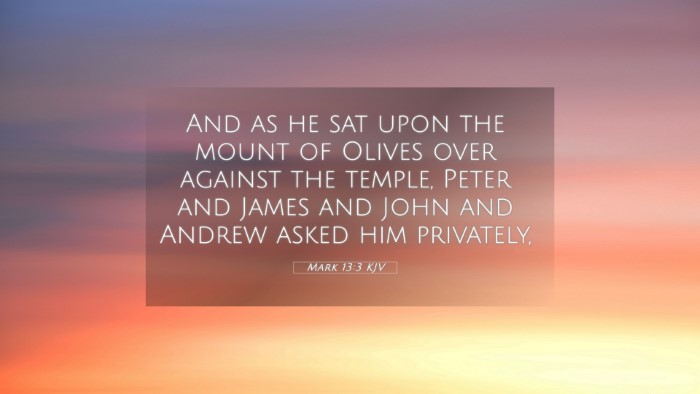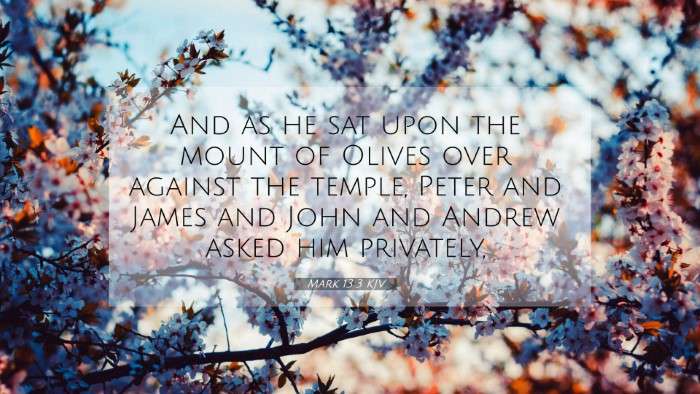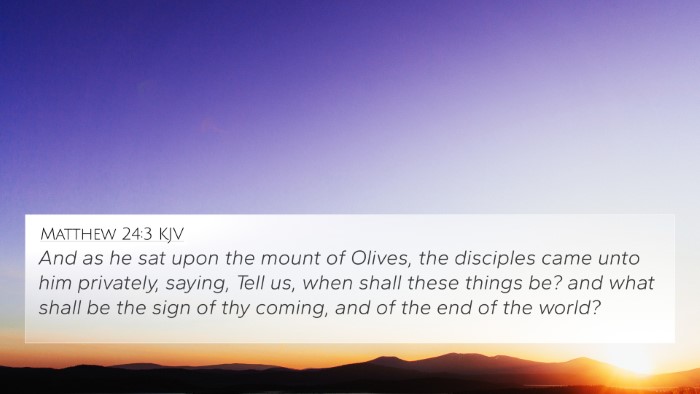Understanding Mark 13:3
Mark 13:3 reads: "And as he sat upon the mount of Olives over against the temple, Peter and James and John and Andrew asked him privately." This verse introduces a significant moment where Jesus' disciples seek deeper understanding from him. Below is a comprehensive analysis of this verse drawn from noted public domain commentaries, offering insights into its thematic relevance and Biblical connections.
Verse Analysis and Meaning
This verse is set against the backdrop of Christ's prophetic discourse regarding the destruction of the temple and the end times. Here is a detailed breakdown of the insights:
-
Setting and Context:
Matthew Henry emphasizes the solemnity of the moment. The Mount of Olives symbolizes a place of revelation and prophecy, giving the disciples a viewpoint of the temple’s imminent destruction.
-
Disciples' Inquiry:
Albert Barnes notes that the selection of Peter, James, John, and Andrew showcases those who were closest to Jesus, highlighting their eagerness to learn and the importance of private discourse with the Lord.
-
Significance of Privacy:
Adam Clarke points out that the disciples' desire to ask questions privately signifies their understanding of the seriousness of Jesus' prophecies. This underscores the value of personal, intimate dialogue in spiritual growth.
Cross-References to Mark 13:3
This verse resonates with numerous other scriptures, linking thematically and contextually to enhance understanding:
-
Matthew 24:3:
Similar to Mark 13:3, this verse also speaks of the disciples privately inquiring about the signs of Christ's coming and the end of the age.
-
Luke 21:7:
This parallel account reinforces the disciples' concern about the destruction of the temple and the end times, showcasing inter-Biblical dialogue.
-
John 14:2:
In the context of Jesus preparing a place for his followers, this verse connects to the eschatological themes prevalent in Mark 13.
-
Acts 1:6:
The disciples’ inquiry about the restoration of the kingdom resonates with their longing for understanding of prophetic timelines.
-
Matthew 16:13-17:
This account of Peter's confession highlights the importance of recognizing who Jesus is, setting the stage for understanding his prophetic statements.
-
1 Thessalonians 5:2-3:
This New Testament passage addresses the specifics of the Day of the Lord and highlights the parallels between Paul’s teachings and Jesus’ prophetic words.
-
Hebrews 10:25:
The call to gather and seek understanding together echoes the private inquiries of the disciples in Mark 13:3.
Thematic Connections
Thematically, Mark 13:3 is rich with implications concerning:
-
Prophecy and Fulfillment:
The verse sets the foundation for a discussion on Jesus' predictions about the future, linking to other prophetic scriptures in both Testaments.
-
Discipleship:
The eagerness of the disciples to understand deeper doctrines demonstrates a key aspect of being a follower of Christ—seeking knowledge and understanding.
-
Jesus' Authority:
As the disciples approach Him with their questions, it underscores His role as the ultimate Teacher and the source of truth.
Conclusion
Mark 13:3 serves as a profound invitation to believers to seek deeper truths within the scriptures. It illustrates the importance of dialogue with the Lord and highlights significant cross-references that enrich our understanding of Biblical prophecy and discipleship. By exploring these connections through tools like a Bible concordance or cross-reference Bible study techniques, one can uncover the intricate relationships between different passages that form the foundation of Christian faith and eschatological hope.
Further Study and Reflection
For those interested in delving further, consider these tools for Bible cross-referencing:
- Bible cross-reference guide to systematically link related topics.
- Comprehensive Bible cross-reference materials for in-depth study.
- Bible reference resources to explore the connections between Old and New Testament themes.














